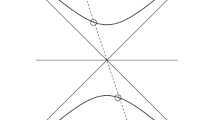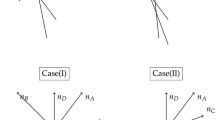Abstract.
In this paper the axiomatic basis will be a general absolute plane A = (\({\mathcal{P}}, {\mathcal{L}}, \alpha, \equiv\)) in the sense of [6], where \({\mathcal{P}}\) and \({\mathcal{L}}\) denote respectively the set of points and the set of lines, α the order structure and ≡ the congruence, and where furthermore the word “general” means that no claim is made on any kind of continuity assumptions. Starting from the classification of general absolute geometries introduced in [5] by means of the notion of congruence, singular or hyperbolic or elliptic, we get now a complete characterization of the different possibilities which can occur in a general absolute plane studying the value of the angle δ defined in any Lambert–Saccheri quadrangle or, equivalently, the sum of the angles of any triangle. This yelds, in particular, a Archimedes-free proof of a statement generalizing the classical “first Legendre theorem” for absolute planes.
Similar content being viewed by others
Author information
Authors and Affiliations
Corresponding author
Additional information
Research partially supported by the Research Project of the Italian Ministry of University and Research “Strutture geometriche, combinatoria e loro applicazioni” and by the research group GNSAGA of INDAM.
Received: June 11, 2007. Revised: June 18, 2007.
Rights and permissions
About this article
Cite this article
Karzel, H., Marchi, M. & Pianta, S. Legendre-like Theorems in a General Absolute Geometry. Result. Math. 51, 61–71 (2007). https://doi.org/10.1007/s00025-007-0258-0
Published:
Issue Date:
DOI: https://doi.org/10.1007/s00025-007-0258-0




